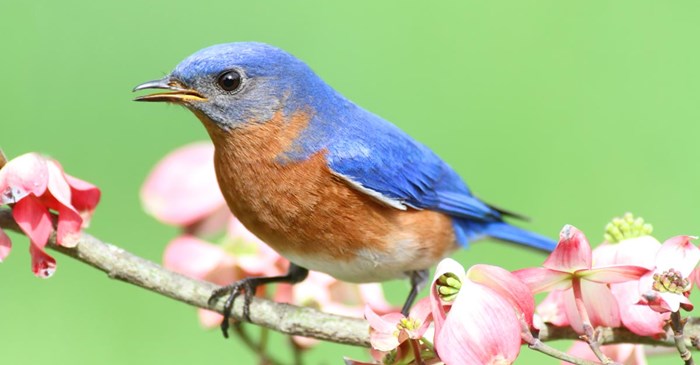Eastern Bluebirds are a welcome, bright sight as you’re traveling through open areas of eastern North America. Their cobalt backs and brick-red chests are easily spotted along fence posts and telephone wires. If you’re interested in learning more about these bright feathered friends, as well as how to attract them to your yard, check out these 10 fascinating facts about the Eastern Bluebird!
- Eastern Bluebirds can be found as far north as Canada, and as far south as Nicaragua
- Bluebirds that live further north and in the west tend to lay more eggs than ones living further south and east.
- Eastern Bluebirds are found most often in open country areas around trees, but with sparse groundcover - and are most common along pastures, fields, backyards and golf courses.
- Bluebirds don’t have the strength to dig out their own nesting holes in trees, so they have to rely on pre-existing cavities or bluebird boxes.
- Popular across the U.S., the Eastern Bluebird is state bird in both Missouri and New York
- Eastern Bluebirds are both omnivores and insectivores -- eating both seeds, berries, wild fruits, and insects.
- Since Eastern Bluebirds love to eat insects, it is best to place your bluebird nesting boxes near your garden. They will keep pesky bugs away while bringing a splash of color to your garden.
- Did you know the bluebird is a symbol of hope, love, and renewal and is also a part of many Native American legends? It is suggested that dreaming of bluebirds represents happiness, joy, fulfillment, hope, prosperity, and good luck.
- The Eastern Bluebird’s beak is not shaped for cracking seeds. That’s why they often eat insects or prefer seeds that are finely cut into bite-sized pieces.
- Eastern Bluebirds don’t commonly visit feeders unless they’re filled with mealworms, but they will make an exception if you have it filled with Lyric Fine Tunes No Waste Mix. They enjoy the finely chopped pieces of peanuts, pistachios, almonds, pecans, pumpkin seeds, sunflower kernels, and hulled white proso millet. It is 100% edible - giving you a high-quality seed mix and the birds won’t leave any leftovers.
